Profile: Lord Patten
- Published
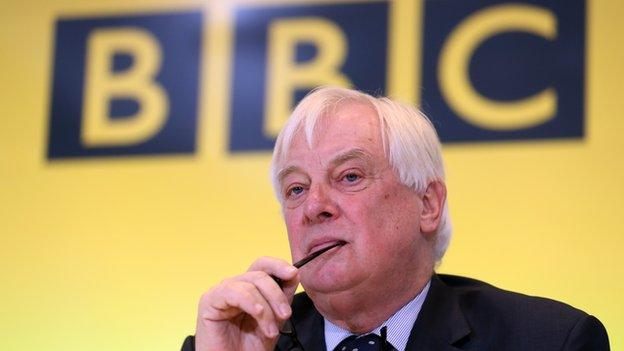
Lord Patten had a turbulent tenure, including the Savile crisis and the row over senior staff pay-offs
Lord Patten, who is standing down as BBC Trust chairman with immediate effect on health grounds, has faced a turbulent period during his time at the corporation.
His tenure has coincided with the Jimmy Savile crisis; a Newsnight report which led to Lord McAlpine facing false claims of abuse; the row over executive pay-offs; and a £98m loss on a scrapped IT project.
No stranger to challenging roles, Lord Patten - a former Conservative minister and governor of Hong Kong - became chairman of the BBC Trust in 2011. The body, which replaced the BBC governors in 2004, is supposed to oversee the corporation on behalf of licence fee payers.
As chairman, one of Lord Patten's first jobs was to appoint a successor to director general Mark Thompson.
His chosen candidate, George Entwistle, lasted just 54 days before resigning over the handling of a BBC Newsnight report which falsely implicated Tory peer Lord MacAlpine in a child abuse scandal in Wales.
Mr Entwistle's departure came with a £450,000 pay-off, reigniting a debate over the BBC's pay structure, which saw Lord Patten and several other senior BBC figures grilled by politicians.
A trawl through the accounts found that 150 outgoing executives had received redundancy packages totalling £25m between 2009 and 2012 - much more than their contracts entitled them to.
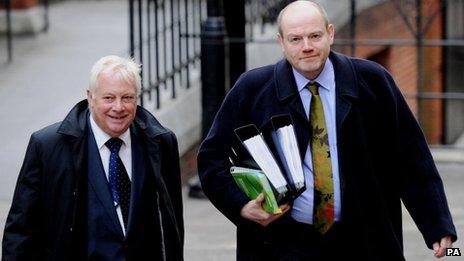
Lord Patten and Mark Thompson clashed over the issue of BBC executive pay
At a Public Accounts Committee hearing last July, Lord Patten told MPs he had been "shocked and dismayed" to learn of the overpayments after they had been made.
But Mr Thompson accused him of "fundamentally misleading" parliament over what the BBC Trust knew about two of the controversial pay-outs - the £1m paid to former deputy director general Mark Byford, and the £387,500 given to the marketing director Sharon Baylay.
The controversy put the future of the trust in the spotlight, with some reports suggesting it would be scrapped and regulation of the BBC handed to media watchdog Ofcom.
In November last year, Lord Patten told the New Statesman, external it was important that the BBC did not "lose its nerve".
"The BBC is the only institution that I've been associated with which gets a sense of Schadenfreude about its own problems or mistakes. It beats itself up more. I think we should start to be more positive about ourselves," he said.
"Just after the Savile hits - an awful, dispiriting look into the cultural practices of the Sixties, Seventies and Eighties - polls showed that despite Savile the BBC was one of the only institutions in the country that people trust and feel proud of. The NHS, armed forces, monarchy, BBC all had big percentages in favour."
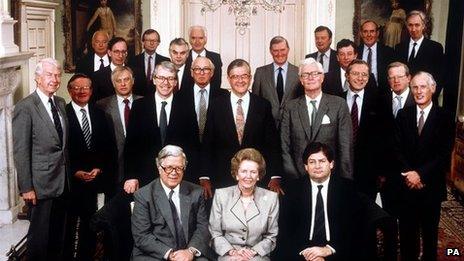
Chris Patten [third from left, middle row] was a member of the 1989 Tory Cabinet
Lord Patten is the son of a jazz musician who attended a Roman Catholic day school in Ealing, before winning a place at Balliol College, Oxford.
His first encounter with the BBC was shortly after leaving university when he was offered a traineeship but he turned the placement down, preferring to take a job in the US working with the Republican Party.
On returning to England, he ran the Conservative Party's research department before entering parliament in 1979, and it was not long before he became a minister under Margaret Thatcher.
Despite his distinctly un-Thatcherite views, he pushed along some of her most controversial legislation - including the poll tax.
He later became the party chairman under Mrs Thatcher's successor, John Major, spearheading the Conservatives' 1992 general election campaign.
Lord Patten helped to win the election for the Tories, but lost his own seat in Bath to the Liberal Democrats in the process.
Political freedoms
This political disaster turned out to be a blessing in disguise for Lord Patten, who was rewarded for his election efforts with the governorship of Hong Kong.
He was determined to bequeath a vestige of democracy to Hong Kong, despite opposition from the Foreign Office.
A parliament, known as Legco, was assembled before the island was handed back to China, and though this was dissolved by Beijing, Hong Kong's citizens still enjoy relative political freedoms that are forbidden to their mainland neighbours.
Relations between Lord Patten and the Chinese authorities remained strained.
Chinese officials and media came up with a variety of insults including the nickname "fatty pang".
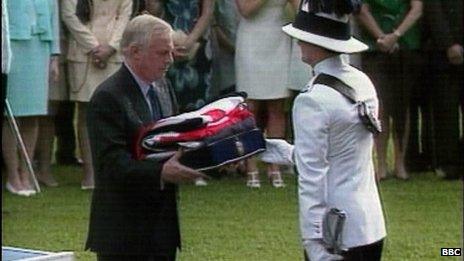
Lord Patten receives the Union Jack flag and Hong Kong Colonial flag as part of the Hong Kong handover ceremony in 1997
Nevertheless, the handover of Hong Kong to China in June 1997 was largely seen as a great success and few will forget the sight of the former governor crying as the union jack was taken down.
He later described the job as the experience that shaped him for the rest of his life.
On returning to the UK, he was appointed by Labour Prime Minister Tony Blair as chairman of the Commission into Policing in Northern Ireland, one of the cornerstones of the Good Friday Agreement.
His report into the police service recommended a radical overhaul, and came under considerable fire from unionists who objected to proposals for a name change, a new badge, a new oath of allegiance and a new flag.
The following year, he was appointed European Commissioner for external relations, but strong opposition from France and Germany meant he pulled out of the race to succeed Romano Prodi as president of the EU Commission.
He became chancellor of Oxford University, took over as chairman of the International Crisis Group, was made a peer in 2004 and has written books about world affairs.
He took up his role at the BBC Trust in 2011. During pre-appointment hearings before a Commons committee, he admitted he was not an EastEnders viewer.
"I watch the programmes that you'd expect somebody of my background to," he told MPs.
In fact, the committee expressed surprise that Lord Patten's knowledge of the BBC's output on television and radio was limited, but considered him a suitable candidate for the post.
He became a tireless supporter of the organisation and, despite his tribulations, he also witnessed the BBC's successful coverage of the Olympics, and an increase in audience share.
Lord Patten said of his decision to stand down from the BBC: "It would not be fair to my family to continue as before; and equally it would not be fair to the BBC and those it serves not to be able to give that commitment which the role demands."
He said it had been "a privilege" to have served as chairman of the BBC Trust, but added that "it is not perfect - what institution is?"
- Published6 May 2014
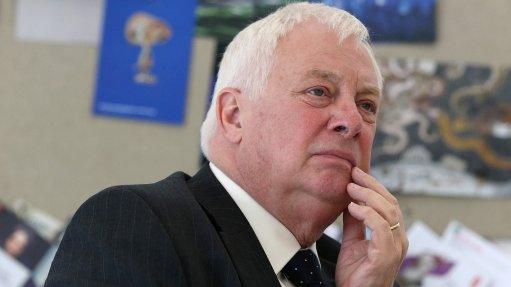
- Published10 March 2011
- Published25 February 2011
- Published8 June 2010